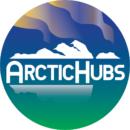Shaping the future of Arctic industries: a new policy brief from ArcticHubs
How do we create a sustainable Arctic where both traditional livelihoods and new economic opportunities can coexist and thrive? The ArcticHubs project, as part of its ongoing work, has explored this question deeply, resulting in a new policy brief that offers key insights and recommendations for Arctic stakeholders. The policy brief, Desired Futures for Arctic Industries, is the outcome of extensive futures studies conducted in partnership with local and indigenous …
